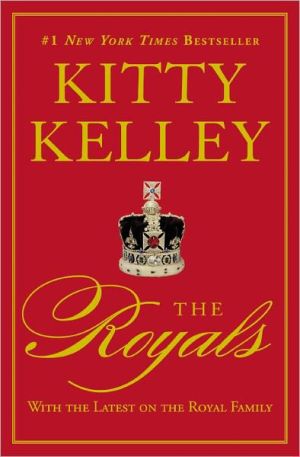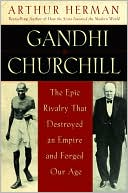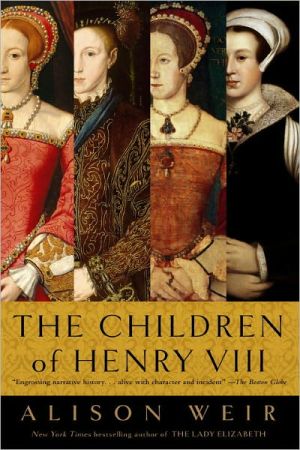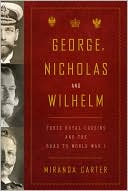The Royals
Kitty Kelly's exposes of Oprah Winfrey, Frank Sinatra, Nancy Reagan, and Jackie Onassis have made her the world's most successful biographer. In this controversial book, after four years of research and hundreds of interviews with palace insiders, she unveils the best-kept secrets in Britain: the questions around one queen's parentage and another's conception...and the well-hidden royal affairs...the real reason for the tumultuous relationship between the Queen Mum and Diana...the...
Search in google:
Biography of the British royal family; includes new chapter. Library Journal Gossipmonger Kelly narrates her latest unauthorized biography, this time targeting Britain's royal family. She has included some interesting factual information about the royals, describing the early-20th-century history of the family and its ties to Germany. But the biography is a mix of fact and tawdry, unsubstantiated innuendo (Phillip may be bisexual, one son may not be his, etc.). Wherever possible, Kelley's inflections as narrator make events seem naughtier still. There are two obvious flaws: not once are sources cited clearly, and most of the slurs are based on what someone says without scrutiny of motives. Of the family, the Queen comes out of the fray best, and Charles definitely gets the worst of it. Throughout, schlock rules over scholarship. Not recommended.Mark Pumphrey, Polk Cty. P.L., Columbus, N.C.
The Royals\ \ By Kitty Kelley \ Wheeler Publishing\ Copyright © 1998 Kitty Kelley\ All right reserved.\ ISBN: 1568955294 \ \ \ Chapter One\ Once upon a time ... the House of Windsor was a fantasy. The figment of a courtier's imagination. The dynasty was created in 1917 to conceal the German roots of the King and Queen, and the deception enabled the monarchy to be perceived as British by subjects who despised Germany. Until then, many English kings never spoke the King's English. They spoke only German because for almost two hundred years, from 1714 until this century, a long line of Germans ruled the British empire. By 1915 England finally had a king, George V, who could speak English without a German accent. Although he was a German from the Saxe-Coburg-Gotha line that had ruled England for eighty years, he considered himself to be indisputably British. His subjects, who hated Germany, Germans, and all things Germanic, were not convinced. \ For years, especially in the early 1900s, the English had become increasingly afraid of Prussian militarism. They felt threatened by the Kaiser's oppression. And they were "sore-headed and fed up," as George Bernard Shaw wrote, with Germany's rattling sabers. They viewed World War I as a war against Germany. Newspapers carried eyewitness accounts of revolting cruelty by the Germans, who bombed undefended towns and killed civilians. Those actions shocked the world in 1915. In England, editorialsdenounced "The March of the Hun" and "Treason to Civilization" as German U-boats sank British ships. The mounting death tolls on French battlefields caused hardships in England, which exacerbated Britain's hatred of foreigners. King George V was disturbed as he watched his subjects stone butchers with German names and burn the homes of people who owned dachshunds. Pretzels were banned and symphony conductors shunned Mozart and Beethoven. This antipathy was not unique to Great Britain. Blood hatred of everything German had infected all of Europe and spread to America, where Hollywood produced a string of hate films such as To Hell with the Kaiser, Wolves of Kultur, and The Kaiser: The Beast of Berlin.\ The King of England deplored the "hysterical clamor," calling it "petty and undignified," but few listened. The image of the hideous Hun as a fiendish torturer who raped, pillaged, and murdered innocents had gripped the public imagination. The King became so concerned about the reaction of his volatile subjects that he was afraid to protect his relatives of German descent. Instead he stood by silently as his beloved cousin Prince Louis of Battenberg was vilified simply because of his German name. When war had threatened, Battenberg as the First Sea Lord of the Royal Navy mobilized the Admiralty with speed and efficiency, so that when war broke out, England was ready. But Battenberg, a naturalized British subject, became a target for abuse: his name was German, he was born in Germany, he spoke with a German accent, he employed German servants, and he owned property in Germany. Despite his total loyalty to the Crown, he was forced to resign his military position and relinquish his princely title. The final humiliation occurred when the King told him to change his name. Shattered, Prince Louis dutifully anglicized Battenberg (berg is "mountain" in German) to Mountbatten to make it acceptable to the English. The King tried to mollify his cousin by making him a British noble. Louis accepted the title of Marquess of Milford Haven because he wanted his children to be noblemen, but he never recovered from the shame of renouncing his ancestry. Somehow, though, he kept his sense of humor. He wrote in his son's guest book: "June 9th arrived Prince Hyde; June 19th departed Lord Jekyll." His younger son and namesake, Louis, was shocked by the news of his father's resignation. "It was all so stupid," he recalled years later. "My father had been in the Royal Navy for forty-six years. He was completely identified with England, and we always regarded ourselves as an English family. Of course, we were well aware of our German connections; how could we not be? It certainly never occurred to any of us to be ashamed of them-rather the contrary. We are a very old family, and proud of it.... My father had worked his way to the top of the Royal Navy by sheer ability and industry. And now his career was finished-all because of the ridiculous suspicion that he might be in secret sympathy with the very people he had come to England to avoid!"\ Next, the King moved to cleanse the rest of his German family. Like the monarchs of mythology who bring magic clouds with them wherever they go, King George V waved his royal wand. Overnight, one brother-in-law-the Duke of Teck-became the Marquess of Cambridge, and the other-Prince Alexander of Teck-became the Earl of Athlone. One stroke of the royal quill eradicated all traces of Mecklenberg-Strelitz, Hesse, and Wettins from the King's lineage: the ugly German ducklings were transformed into beautiful British swans. The royal family's Teutonic dukes, archdukes, and princelings instantly became English marquises. But the King felt he still needed to make the monarchy appear less imperial to survive. He decreed that members of the royal family could marry into the nobility. So, for the first time in history, royalty could marry commoners, whether they were titled or not. This paved the way for his second son, Albert, known to the family as "Bertie," to propose to a sweet-faced Scottish girl, reared as an Earl's daughter, although her mother has been rumored to have been one of the Earl's Welsh servant girls (these rumors, never officially acknowledged, have yet to be borne out by any evidence). Ironically, Bertie's marriage in 1923 to the commoner, Elizabeth Bowes-Lyon, brought stability to the British throne and propped up the dynasty for several generations. During the First World War, concern was voiced over the bloody role of the King's German cousin Prince Albert of Schleswig-Holstein, who was in charge of British prisoners of war in a camp outside Berlin. "He's not really fighting on the side of the Germans," said the King defensively. "He was only put in charge of a camp of English prisoners." "A nice distinction," Prime Minister Asquith later observed to a friend. His successor, Lloyd George, was even more blunt. When he received a royal summons to the Palace, he turned to his secretary and said: "I wonder what my little German friend has got to say to me." The Prime Minister's antipathy spread to his staff, who kept the King's private secretary, Lord Stamfordham, waiting on a wooden chair in the hall and refused to rise when he entered their office. The private secretary ignored the discourtesy. "We are all servants," he told shocked courtiers, "although some are more important than others." As the devoted secretary to Queen Victoria, Lord Stamfordham was by far the most important of the King's men. He had served Victoria's heir, King Edward VII, who had put him in charge of his own son, George, at an early age. "He taught me how to be a king," said the master of his servant. It was Lord Stamfordham who received the unenviable job of telling King George V about D. H. Lawrence, who had been hounded into hiding because he married a German woman. The once revered writer had married the sister of German military aviator Baron Manfred von Richthofen, the legendary Red Baron, credited with shooting down eighty Allied planes during World War I. After their wedding, Lawrence and his bride, Frieda, were forced by public hostility to seek refuge in the English countryside, where they hid in barns like animals. This news was unsettling to the King, who also had a German wife. But the clever Queen-Mary of Teck-speaking English with a slight guttural accent, began referring to herself as "English from top to toe." The King immediately stopped addressing Kaiser Wilhelm II of Germany, the commander of the German forces sweeping across Europe, as "sweet cousin Willy." His German-hating subjects, who avoided references to sex, began referring to the male member as a "Willy." Still, the hatred of Germans became so intense in England that the King's mother begged him to remove the Kaiser's honorary flags from the chapel. "Although as a rule I never interfere, I think the time has come when I must speak out," wrote Queen Alexandra. "It is but right and proper for you to have down those hateful German banners in our sacred Church, St. George's, at Windsor."\ The Queen Mother sent her letter to "my darling little Georgie" after the Daily Mail had excoriated him for allowing the eight flags of "enemy Emperors, Kings and Princes" a place of honor at Windsor. "As long as the offending banners remain, their owners will be prayed for," thundered the newspaper. "What are the King's advisors doing?"\ The King ignored the criticism until it came from his "darling Mother dear." Then he yielded and had the banners removed. "Otherwise," he told a friend, "the people would have stormed the chapel." The King then threw himself and his family into the war effort. He dispatched his sons to the western front, sending the Prince of Wales (Edward, but known to the family as David) to France, while Prince Albert (Bertie) served on the battleship HMS Collingwood. The King banned alcohol and began strict rationing at the Palace to set a national example. In March 1917 his cousin the Emperor Nicholas II of Russia ("dear Nicky") was forced to abdicate, in part because he, too, had a German wife whom the King blamed "for the present state of chaos that exists in Russia." The King's equerry was more brutal on the subject: "The Empress is not only a Boche by birth, but in sentiment. She did all she could to bring about an understanding with Germany. She is regarded as a criminal or a criminal lunatic and the ex-Emperor as a criminal for his weakness and submission to her promptings." That was all the King needed to hear. Concerned about the survival of his throne, he withdrew the warm friendship he had once extended to his "beloved cousin." When the Czar appealed for asylum for himself and his family, the King refused, prohibiting them entry into England. The King felt he needed to separate himself from Russian imperialism, especially when wrapped with a German ribbon. So he wrote his cousin that he did not think it "advisable that the Imperial Family should take up their residence in this country." He suggested instead Spain or the South of France. At that point the revolutionaries in Russia realized that the King would not use military force to save his relatives. Thus abandoned, the Czar and his family were seized and sent to Siberia. The King was more determined than ever to hang on to his threatened monarchy. He resented references to his German ancestry and raged over the caricatures of Max Beerbohm, who drew him as a comical and lugubrious figure. He lost his temper when a Labor Member of Parliament called him "a German pork butcher," and he erupted again when H. G. Wells branded him a foreigner. In a letter to the Times, the British journalist and novelist called for an end to "the ancient trappings of the throne and sceptre." He damned the royal house of Saxe-Coburg-Gotha by calling it "an alien and uninspiring Court."\ "I may be uninspiring," boomed the King, "but I'll be damned if I'm an alien." He resolved then and there to rid himself and his royal house of what he saw as its dreadful German taint. With the greatest sleight of hand since the sorcery of Prospero, he asserted his divine right and rechristened himself with the most euphonious, melodious British name conceivable. His courtiers had spent weeks searching for just such a name that would reestablish the monarchy as thoroughly English. Finally, Lord Stamfordham found it and secured his place in history by proposing the name of Windsor. That one word summoned up what the King was looking for-a glorious image that resonated with history, stretching back to William the Conqueror. For Windsor Castle, the most thoroughly British symbol extant, had been the site of English monarchs for eight hundred years. Although no king had ever lived there, several had died in Windsor Castle, and nine were buried in its royal crypt. The name was enough to redeem a tarnished crown. The proclamation of the House of Windsor was announced on July 17, 1917, and appeared the next day on the front pages of England's newspapers. The British press dutifully reported that the King had renounced his German name and all German titles for himself and all other descendants of Queen Victoria and that henceforth he and his issue were to be referred to as the House of Windsor. In the United States, news of the British royal family's reinventing itself was reported on page nine of The New York Times. In an editorial, the Times noted "the unnaming and renaming" was approved in a meeting of the largest Privy Council ever assembled and suggested that the name of Windsor, an Anglo-Saxon fortress where the legendary King Arthur sat among the Knights of the Table Round, might have been selected for its "sense of continuity, of ancientness." America's newspaper of record praised England's King for choosing "a venerable name for his house." In Germany, the news was reported with less reverence. The Kaiser laughed at his quixotic cousin and said that he was looking forward to attending a performance of that well-known play The Merry Wives of Saxe-Coburg-Gotha. But the Kaiser appreciated the political necessity of accommodation. As he pointed out, "Monarchy is like virginity-once lost, you can't get it back." Still, he exacted revenge nineteen years later when the King died by sending the Duke of Saxe-Coburg-Gotha to his cousin's funeral in Windsor Castle. The Duke wore his Nazi uniform. George V never expressed any qualms about his actions. He pragmatically buried his German roots to save his throne and then systematically ostracized his foreign relatives. He did this without compunction, even after receiving news from Russia that the Czar and Czarina and their four daughters and young son, who were moved from Siberia and Ekaterinburg, had been massacred by the Bolsheviks. "It was a foul murder," he wrote piously in the diary he kept for posterity. "I was devoted to Nicky, who was the kindest of men and a thorough gentleman." By keeping his distance, the King of England had held his crown in place. He then proceeded to rule the House of Windsor for the next two decades with probity. There was no scandal attached to his reign, and like his grandmother Queen Victoria, he excelled at the virtues the English prize most: duty and punctuality. His subjects saw him as a simple, decent man whose plain tastes reflected their own.\ \ \ \ Continues... \ \ \ \ Excerpted from The Royals by Kitty Kelley Copyright © 1998 by Kitty Kelley. Excerpted by permission.\ All rights reserved. No part of this excerpt may be reproduced or reprinted without permission in writing from the publisher.\ Excerpts are provided by Dial-A-Book Inc. solely for the personal use of visitors to this web site. \ \
\ Library JournalGossipmonger Kelly narrates her latest unauthorized biography, this time targeting Britain's royal family. She has included some interesting factual information about the royals, describing the early-20th-century history of the family and its ties to Germany. But the biography is a mix of fact and tawdry, unsubstantiated innuendo (Phillip may be bisexual, one son may not be his, etc.). Wherever possible, Kelley's inflections as narrator make events seem naughtier still. There are two obvious flaws: not once are sources cited clearly, and most of the slurs are based on what someone says without scrutiny of motives. Of the family, the Queen comes out of the fray best, and Charles definitely gets the worst of it. Throughout, schlock rules over scholarship. Not recommended.Mark Pumphrey, Polk Cty. P.L., Columbus, N.C.\ \








